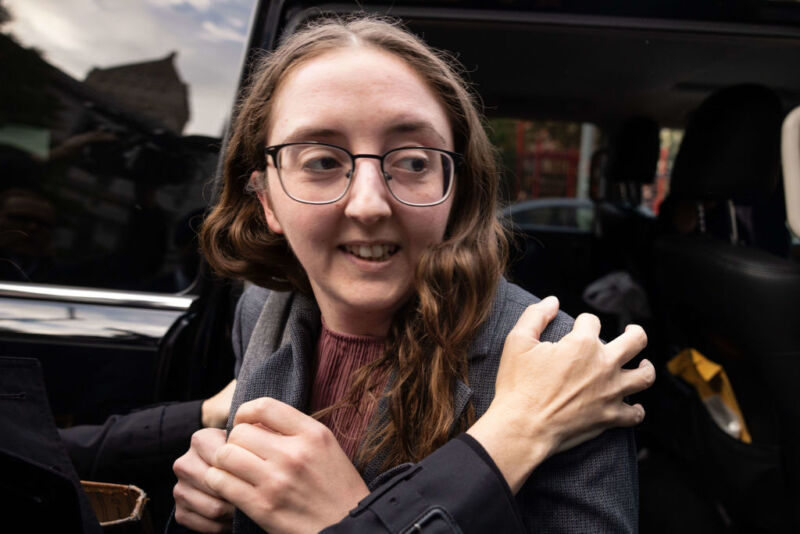Caroline Ellison gets 2 years for covering up Sam Bankman-Fried’s FTX fraud

Enlarge / Caroline Ellison, former chief executive officer of Alameda Research LLC, was sentenced Tuesday for helping Sam Bankman-Fried cover up FTX’s fraudulent misuse of customer funds.
Caroline Ellison was sentenced Tuesday to 24 months for her role in covering up Sam Bankman-Fried’s rampant fraud at FTX—which caused billions in customer losses.
Addressing the judge at sentencing, Ellison started out by explaining “how sorry I am” for concealing FTX’s lies, Bloomberg reported live from the hearing.
“I participated in a criminal conspiracy that ultimately stole billions of dollars from people who entrusted their money with us,” Ellison reportedly said while sniffling. “The human brain is truly bad at understanding big numbers,” she added, and “not a day goes by” that she doesn’t “think about all of the people I hurt.”
Assistant US Attorney Danielle Sassoon followed Ellison, remarking that the government recommended a lighter sentence because it was important for the court to “distinguish between the mastermind and the willing accomplice.” (Bankman-Fried got 25 years.)
US District Judge Lewis Kaplan noted that he is allowed to show Ellison leniency for providing “substantial assistance to the government.” He then confirmed that he always considered the maximum sentence she faced of 110 years to be “absurd,” considering that Ellison had no inconsistencies in her testimony and fully cooperated with the government throughout their FTX probe.
“I’ve seen a lot of cooperators in 30 years,” Kaplan said. “I’ve never seen one quite like Ms. Ellison.”
However, although Ellison was brave to tell the truth about her crimes, Ellison is “by no means free of culpability,” Kaplan said. He called Bankman-Fried her “Kryptonite” because the FTX co-founder so easily exploited such a “very strong person.” Noting that nobody gets a “get out of jail free card,” he sentenced Ellison to two years and required her to forfeit about $11 billion, Bloomberg reported.
The judge said that Ellison “can serve the sentence at a minimum-security facility,” Bloomberg reported.
Ellison was key to SBF’s quick conviction
Ellison could have faced a maximum sentence of 110 years, for misleading customers and investors as the former CEO of the cryptocurrency trading firm linked to the FTX exchange, Alameda Research. But after delivering devastatingly detailed testimony key to exposing Bankman-Fried’s many lies, the probation office had recommended a sentence of time served with three years of supervised release.
Kaplan’s sentence went further, making it likely that other co-conspirators who cooperated with the government probe will also face jail time.
Both Ellison and the US government had requested substantial leniency due to her “critical” cooperation that allowed the US to convict Bankman-Fried in record time for such a complex criminal case.
Partly because Ellison was romantically involved with Bankman-Fried and partly because she “drafted some of the most incriminating documents in the case,” US attorney Damian Williams wrote in a letter to Kaplan, she was considered “crucial to the Government’s successful prosecution of Samuel Bankman-Fried for one of the largest financial frauds in history,” Williams wrote.
Williams explained that Ellison went above and beyond to help the government probe Bankman-Fried’s fraud. Starting about a month after FTX declared bankruptcy, Ellison began cooperating with the US government’s investigation. She met about 20 times with prosecutors, digging through thousands of documents to identify and interpret key evidence that convicted her former boss and boyfriend.
“Parsing Alameda Research’s poor internal records was complicated by vague titles and unlabeled calculations on any documents reflecting misuse of customer funds,” Ellison’s sentencing memo said. Without her three-day testimony at trial, the jury would likely not have understood “Alameda’s intentionally cryptic records,” Williams wrote. Additionally, because Bankman-Fried systematically destroyed evidence, she was one of the few witnesses able to contradict Bankman-Fried’s lies by providing a timeline for how Bankman-Fried’s scheme unfolded—and she was willing to find the receipts to back it all up.
“As Alameda’s nominal CEO and Bankman-Fried’s former girlfriend, Ellison was uniquely positioned to explain not only the what and how of Bankman-Fried’s crimes, but also the why,” Williams wrote. “Ellison’s testimony was critical to indict and convict Bankman-Fried, and to understanding both the timeline of the fraud schemes, and the various layers of wrongdoing.”
Further, where Bankman-Fried tried to claim that he was “well-meaning but hapless” in causing FTX’s collapse, Ellison admitted her guilt before law enforcement ever got involved, then continually “expressed genuine shame and remorse” for the harms she caused, Williams wrote.
A lighter sentence, Ellison’s sentencing memo suggested, “would incentivize people involved in a fraud to do what Caroline did: publicly disclose a fraud, immediately accept responsibility, and cooperate immediately with civil and criminal authorities.”
Williams praised Ellison as exceptionally forthcoming, even alerting the government to criminal activity that they didn’t even know about yet. He also credited her for persevering as a truth-teller “despite harsh media and public scrutiny and Bankman-Fried’s efforts to publicly weaponize her personal writings to discredit and intimidate her.”
“The Government cannot think of another cooperating witness in recent history who has received a greater level of attention and harassment,” Williams wrote.
In her sentencing memo, Ellison’s lawyers asked for no prison time, insisting that Ellison had been punished enough. Not only will she recover “nothing” from the FTX bankruptcy proceedings that she’s helping to settle, but she also is banned from working in the only industries she’s ever worked in, unlikely to ever repeat her crimes in finance and cryptocurrency sectors. She also is banned from running any public company and “has been rendered effectively unemployable in the near term by the notoriety arising from this case.”
“The reputational harm is not likely to abate any time soon,” Ellison’s sentencing memo said. “These personal, financial, and career consequences constitute substantial forms of punishment that reduce the need for the Court to order her incarceration.”
Kaplan clearly disagreed, ordering her to serve 24 months and forfeit $11 billion.
Caroline Ellison gets 2 years for covering up Sam Bankman-Fried’s FTX fraud Read More »


